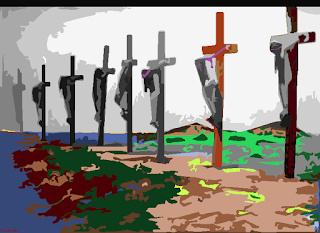The sea is calm to-night.
The tide is full, the moon lies fair
Upon the straits; on the French coast the light
Gleams and is gone; the cliffs of England stand;
Glimmering and vast, out in the tranquil bay.
Come to the window, sweet is the night-air!
Only, from the long line of spray
Where the sea meets the moon-blanched land,
Listen! you hear the grating roar
Of pebbles which the waves draw back, and fling,
At their return, up the high strand,
Begin, and cease, and then again begin,
With tremulous cadence slow, and bring
The eternal note of sadness in.
Sophocles long ago
Heard it on the Aegean, and it brought
Into his mind the turbid ebb and flow
Of human misery; we
Find also in the sound a thought,
Hearing it by this distant northern sea.
The Sea of Faith
Was once, too, at the full, and round earth's shore
Lay like the folds of a bright girdle furled.
But now I only hear
Its melancholy, long, withdrawing roar,
Retreating, to the breath
Of the night-wind, down the vast edges drear
And naked shingles of the world.
Ah, love, let us be true
To one another! for the world, which seems
To lie before us like a land of dreams,
So various, so beautiful, so new,
Hath really neither joy, nor love, nor light,
Nor certitude, nor peace, nor help for pain;
And we are here as on a darkling plain
Swept with confused alarms of struggle and flight,
Where ignorant armies clash by night.
The title of a poem is a form of semiotics, like the label underneath a painting in an art gallery. Read the title, and you can deduce the theme. If "On Dover Beach" were a painting, you would expect white cliffs, a shingle beach, a Canute sea, some Vera Lynn bluebirds; elements of nature with most likely a nostalgic edge - something like the illustration I have chosen at the top of the page.
And indeed, the first two and a half lines confirm the prediction. The next two and a half provide the satellite position, the place where the easel is set up: the window of a house close enough to the beach to see its detail, far enough away to catch the distant glow of lights across the English Channel. Expected nostalgia – a scene wistfully remembered – turns out to be present sentiment, not terribly different, as the poet calls his lover to peruse the view, or more likely to stand in the conventional posture of lovers, with the view as a good pretext for a Cialis moment. We are in the realm of love poetry, nature poetry, the pathetic fallacy.
Only... we are not, not really; the entire opening has been a trick, one of those tacky TV adverts that appeal to our most superficial receptors. Draw the potential customer in with shots of Baywatch men and women, and then sell them what you really came to sell. Only. That's the key word – a remarkably ordinary, banal, trite word for a transition in poetry, but "only" is enough. And once the transition is made, the pathetic fallacy proves to be precisely that, a fallacy, and disappears, and with it sentiment also disappears, and if we "Listen!" fastidiously enough, we can hear a philosophical theme slithering like Leviathan out of the sea, the ebb and flow of thought replacing that of the waves.
Words in poetry may be semiotics too, whether standing for themselves in the literal, or functioning as metaphors. One of the great achievements of this human invention, language, is its ability to evoke. Simply to pronounce the name Sophocles is to conjure up a philosophical system, a moral code, a civilisation, a vanished world, and also its continuum into the present. Arnold names Sophocles, and we are no longer on Dover Beach, but on some Aegean sands, wondering perhaps how the Persian or the Trojan war is faring, if Theseus has killed the Minotaur, if hemlock is a useful plant, and whether or not the gods still live on Mount Olympus.
 |
| "Evolution"(© David Prashker 2016) |
To me the great strength, but also the great weakness of this poem, is its final verse. Sophocles took the hemlock, and joined his dead gods in the oblivion of permanent remembrance; Arnold has already called his lover – his wife, in fact, Frances Wightman – to the window, to share his sadness, but also to nourish his sentimentality. "Ah, love, let us be true to one another" belongs to the soap opera, not the grand opera; even the phrasing is prosaic, breaking the metre and undermining the cadences that till now have sustained this seemingly blank verse. Yet simultaneously the verse breaks into a rhyme scheme that is almost a sonnet, more clearly structured than anything beforehand. The message of love in times of darkness is the poem's, and the poet's, strength; but it is also doomed love, because "the world, which seems/To lie before us like a land of dreams,/So various, so beautiful, so new,/Hath really neither joy, nor love, nor light,/Nor certitude, nor peace, nor help for pain". If I were Frances, I might be thinking that the Cialis was as useless as the hemlock, on this dark night, and my husband lost in melancholia.
You can find David Prashker at:
Copyright © 2016
David Prashker
All rights reserved
The Argaman Press

No comments:
Post a Comment